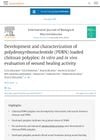75 citations,
June 2007 in “Journal of Biological Chemistry” MT-DADMe-ImmA can selectively kill head and neck cancer cells without harming normal cells.
55 citations,
March 2010 in “Aging” Circadian clock genes are important for hair growth and may affect aging-related hair loss and graying.
 45 citations,
March 2013 in “European Journal of Plastic Surgery”
45 citations,
March 2013 in “European Journal of Plastic Surgery” Injecting platelet-rich plasma is a safe and effective way to treat hair loss.
[object Object] 39 citations,
September 2015 in “Clinical Therapeutics” Teriflunomide effectively reduces relapse rates and disease progression in multiple sclerosis but is not safe for use during pregnancy.
39 citations,
January 2010 in “Trends in Parasitology” Anticancer drugs like methotrexate and trimetrexate could be effective and safe for treating malaria at low doses.
30 citations,
October 2020 in “Frontiers in Plant Science” Combined arsenic and low oxygen stress alters root growth to help plants absorb nutrients.
 29 citations,
April 2019 in “Acta neuropathologica communications”
29 citations,
April 2019 in “Acta neuropathologica communications” Stopping mitochondrial respiration can prevent brain cancer spread in skin cancer patients, and plant compound β-sitosterol could help achieve this.
14 citations,
November 2019 in “Mediators of inflammation” IL-6 from stem cells helps repair skin and grow hair.
8 citations,
June 2023 in “Journal of clinical medicine” Nanofat shows promise for facial rejuvenation and treating skin issues but needs more research for long-term safety.
 8 citations,
February 2022 in “Scientific Reports”
8 citations,
February 2022 in “Scientific Reports” Medicinal herbs might treat hair loss by affecting genes and pathways related to lipid and glycerophospholipid metabolism.
 8 citations,
July 2014 in “Hair transplant forum international”
8 citations,
July 2014 in “Hair transplant forum international” Bio-enhanced hair restoration, using methods like growth factors, stem cells, and ATP, results in better hair growth and density than traditional hair transplants.
 6 citations,
February 2023 in “Biomaterials Research”
6 citations,
February 2023 in “Biomaterials Research” Special gels help heal diabetic foot sores and reduce the risk of amputation or death.
 4 citations,
December 2022 in “Frontiers in Bioengineering and Biotechnology”
4 citations,
December 2022 in “Frontiers in Bioengineering and Biotechnology” Exosomes show promise for improving wound healing, reducing aging signs, preventing hair loss, and lightening skin but require more research and better production methods.
 3 citations,
February 2023 in “International Journal of Molecular Sciences”
3 citations,
February 2023 in “International Journal of Molecular Sciences” Autologous Platelet and Extracellular Vesicle-Rich Plasma (PVRP) has potential in enhancing tissue regeneration and improving hair conditions, but its effectiveness varies due to individual differences.
 3 citations,
October 2022 in “Frontiers in Surgery”
3 citations,
October 2022 in “Frontiers in Surgery” Proteomics combined with other technologies can lead to a better understanding of skin diseases.
3 citations,
May 2022 in “Pediatric Critical Care Medicine” The patient recovered well and returned to college without any lasting issues.
2 citations,
October 2019 in “Nanomedicine” Pharmaceutical care in transplantation faces challenges but has promising future opportunities for better outcomes.
1 citations,
January 2021 in “Wits Journal of Clinical Medicine” Long COVID causes lasting symptoms and needs ongoing care.
 January 2025 in “Applied Sciences”
January 2025 in “Applied Sciences” Sulforaphane from broccoli may help treat certain cancers, hormone issues, and hair loss.
 May 2024 in “BMC veterinary research”
May 2024 in “BMC veterinary research” Metabolites and diet affect hair growth cycles in cashmere goats.
 May 2024 in “Clinical Cosmetic and Investigational Dermatology”
May 2024 in “Clinical Cosmetic and Investigational Dermatology” Manipulating cell cleanup processes could help treat hair loss.
 February 2024 in “Molecules/Molecules online/Molecules annual”
February 2024 in “Molecules/Molecules online/Molecules annual” NMN could potentially treat hair loss by reducing oxidative stress and improving cell health.
 January 2024 in “Journal der Deutschen Dermatologischen Gesellschaft”
January 2024 in “Journal der Deutschen Dermatologischen Gesellschaft” Non-biologic immunosuppressive drugs are crucial for treating autoimmune and chronic inflammatory skin diseases.
 December 2023 in “Aggregate”
December 2023 in “Aggregate” Scientists are using clumps of special stem cells to improve organ repair.
 September 2023 in “International journal of biological macromolecules”
September 2023 in “International journal of biological macromolecules” The chitosan/PDRN polyplex improved wound healing in diabetic rats.
 July 2023 in “Biomolecules”
July 2023 in “Biomolecules” The circadian clock plays a key role in hair growth and its disruption can affect hair regeneration.
[object Object] 
Various substances, quitting smoking, and certain topical applications can enhance the survival of skin flaps used in surgery. Oxygen-free radicals play a role in tissue injury, but certain treatments can have beneficial effects.
June 2022 in “Mayo Clinic Proceedings” The man was diagnosed with stage III multiple myeloma and treated to improve kidney function.
January 2020 in “Journal of translational science”  63 citations,
May 2011 in “Clinical cancer research”
63 citations,
May 2011 in “Clinical cancer research” The topical inhibitor CUR61414 was not effective in treating basal cell carcinoma in human trials.

















